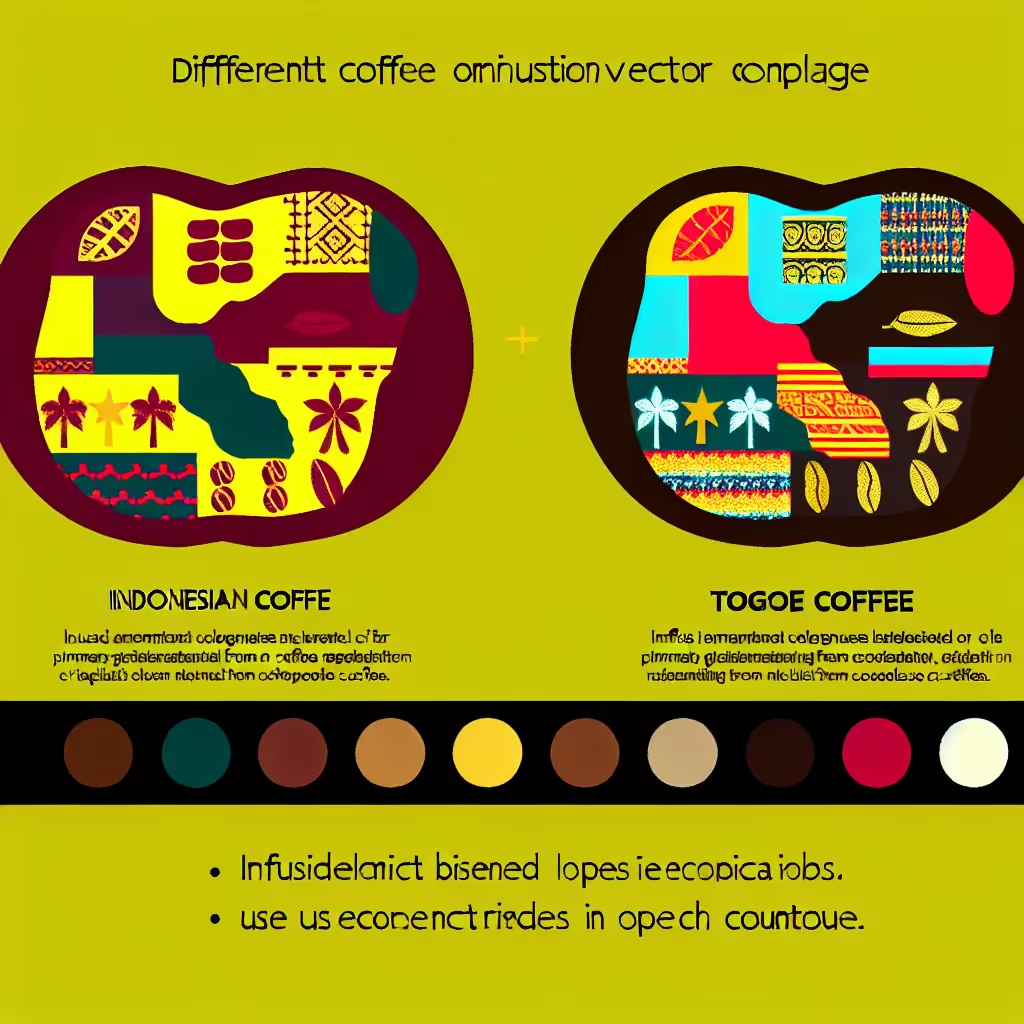Indonesian Vs. Togolese Coffee
This comparison explores the distinct qualities of Indonesian and Togolese coffee, highlighting their unique flavor profiles, growing conditions, and cultural significance in the world of specialty coffee.

Brief Description
Indonesian coffee is renowned for its full body, rich flavor, and low acidity. The unique wet-hulling process used in many regions contributes to its distinct earthy, woody, and sometimes spicy notes. Each island offers its own flavor profile, from the heavy-bodied Sumatran to the cleaner, brighter Javanese coffees. Indonesian coffees are prized for their complexity and exotic character, making them a favorite among specialty coffee enthusiasts.
Togolese coffee, primarily Robusta, is grown in the lush Plateau Region of Togo. Known for its bold flavor and high caffeine content, Togolese coffee has been gaining recognition in recent years. The country's tropical climate and rich volcanic soils contribute to the unique characteristics of its coffee. Despite being a smaller producer, Togo is making strides in improving quality and sustainability practices, aiming to carve out its niche in the specialty coffee market.
Importance of Comparison
Comparing Indonesian and Togolese coffee is crucial for coffee enthusiasts seeking to expand their palate and understand the diverse world of coffee origins. These two regions offer vastly different flavor experiences, processing methods, and production scales, providing valuable insights into how geography and culture influence coffee characteristics. Understanding these differences helps consumers make informed choices and appreciate the nuances of global coffee production.
Key Attributes
Origin
Indonesian
Togolese


Consumer Guide
When choosing between Indonesian and Togolese coffee, consider your flavor preferences and brewing methods. Indonesian coffee is known for its full body, low acidity, and complex earthy notes, making it ideal for French Press or Cold Brew. It's perfect for those who enjoy bold, rich flavors. Togolese coffee, primarily Robusta, offers a strong, bold taste with higher caffeine content, suitable for espresso or cold brew. If you prefer a more intense, caffeinated experience, Togolese might be your choice. Consider the altitude difference: Indonesian coffee (1000-2000m) may have more complex flavors than Togolese (500-1000m). Also, note the production scale: Indonesia's larger output (760,000 metric tons) ensures wider availability compared to Togo's boutique production (15,000 metric tons).
Expert Opinions
Coffee expert Maria Rodriguez notes, 'Indonesian coffee, especially from Sumatra, offers a unique wet-hulled profile that's unmistakable. It's a must-try for those seeking exotic flavors.' On Togolese coffee, specialty roaster John Smith comments, 'Togo's efforts in improving quality are noteworthy. Their Robusta can surprise even the most discerning palates, challenging preconceptions about Robusta coffee.' Both experts agree that comparing these origins provides valuable insights into coffee's diversity.
FAQs
Indonesian coffee typically offers earthy, woody, and spicy notes with hints of dark chocolate and tobacco. It has a full body and low acidity. Togolese coffee, being primarily Robusta, presents a bolder, more intense flavor with earthy, nutty, and chocolatey notes. It generally has higher bitterness and caffeine content compared to Indonesian coffee.
Indonesian coffee is known for its unique wet-hulled (Giling Basah) process, which contributes to its distinct flavor profile. It's also processed using washed and natural methods. Togolese coffee is typically processed using natural, washed, or semi-washed methods. The wet-hulled process in Indonesia creates a more complex, earthy flavor, while Togolese processing methods aim to highlight the bold characteristics of Robusta beans.
For Indonesian coffee, French Press, Pour-over, and Cold Brew are excellent choices to highlight its full body and complex flavors. Togolese coffee, with its bold profile, works well with French Press, Espresso, and Cold Brew methods. The choice of brewing method can emphasize different aspects of each coffee's unique characteristics.
Indonesia is a major coffee producer, with an annual production of about 760,000 metric tons. Togo, on the other hand, is a smaller producer with an annual output of around 15,000 metric tons. This significant difference in scale affects availability and potentially the consistency of the coffee from each origin.
Indonesian coffee is typically grown at higher altitudes (1000-2000m) compared to Togolese coffee (500-1000m). Higher altitude generally results in slower bean development, potentially leading to more complex flavors in Indonesian coffee. The lower altitude of Togolese coffee contributes to its characteristic bold, straightforward flavor profile.
Both countries have sustainability initiatives in place. Indonesia has various certification programs and farmer support systems to promote sustainable practices. Togo, while a smaller producer, is making strides in improving sustainability and quality, focusing on small-scale farmers and cooperative structures to enhance their position in the specialty coffee market.
Conclusion
Indonesian and Togolese coffees offer distinct experiences for coffee enthusiasts. Indonesian coffee, with its complex, earthy profile and unique processing methods, appeals to those seeking exotic, full-bodied brews. Togolese coffee, primarily Robusta, provides a bold, caffeine-rich option that's gaining recognition in the specialty market. While Indonesia's larger production ensures wider availability, Togo's smaller output offers an opportunity to explore a less common origin. Your choice between these two depends on your flavor preferences, brewing methods, and desire for either a well-established or up-and-coming coffee origin. Both offer unique insights into the diverse world of coffee, making them valuable additions to any coffee lover's experience.






